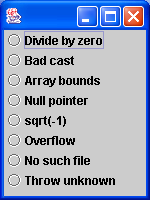Experience exceptions

import java.awt.Frame;
import java.awt.GridLayout;
import java.awt.event.ActionEvent;
import java.awt.event.ActionListener;
import java.awt.event.WindowAdapter;
import java.awt.event.WindowEvent;
import java.io.FileInputStream;
import javax.swing.ButtonGroup;
import javax.swing.JFrame;
import javax.swing.JPanel;
import javax.swing.JRadioButton;
public class ExceptTest extends JFrame implements ActionListener {
private double[] a;
private JRadioButton divideByZeroButton;
private JRadioButton badCastButton;
private JRadioButton arrayBoundsButton;
private JRadioButton nullPointerButton;
private JRadioButton negSqrtButton;
private JRadioButton overflowButton;
private JRadioButton noSuchFileButton;
private JRadioButton throwUnknownButton;
public ExceptTest() {
JPanel p = new JPanel();
ButtonGroup g = new ButtonGroup();
p.setLayout(new GridLayout(8, 1));
divideByZeroButton = addRadioButton("Divide by zero", g, p);
badCastButton = addRadioButton("Bad cast", g, p);
arrayBoundsButton = addRadioButton("Array bounds", g, p);
nullPointerButton = addRadioButton("Null pointer", g, p);
negSqrtButton = addRadioButton("sqrt(-1)", g, p);
overflowButton = addRadioButton("Overflow", g, p);
noSuchFileButton = addRadioButton("No such file", g, p);
throwUnknownButton = addRadioButton("Throw unknown", g, p);
getContentPane().add(p);
}
private JRadioButton addRadioButton(String s, ButtonGroup g, JPanel p) {
JRadioButton button = new JRadioButton(s, false);
button.addActionListener(this);
g.add(button);
p.add(button);
return button;
}
public void actionPerformed(ActionEvent evt) {
try {
Object source = evt.getSource();
if (source == divideByZeroButton) {
a[1] = a[1] / a[1] - a[1];
} else if (source == badCastButton) {
Frame f = (Frame) evt.getSource();
} else if (source == arrayBoundsButton) {
a[1] = a[10];
} else if (source == nullPointerButton) {
Frame f = null;
f.setSize(200, 200);
} else if (source == negSqrtButton) {
a[1] = Math.sqrt(-1);
} else if (source == overflowButton) {
a[1] = 1000 * 1000 * 1000 * 1000;
int n = (int) a[1];
} else if (source == noSuchFileButton) {
FileInputStream is = new FileInputStream("Java Source and Support");
} else if (source == throwUnknownButton) {
throw new UnknownError();
}
} catch (RuntimeException e) {
System.out.println("Caught RuntimeException: " + e);
} catch (Exception e) {
System.out.println("Caught Exception: " + e);
}
}
public static void main(String[] args) {
JFrame frame = new ExceptTest();
frame.setSize(150, 200);
frame.addWindowListener(new WindowAdapter() {
public void windowClosing(WindowEvent e) {
System.exit(0);
}
});
frame.show();
}
}
Related examples in the same category